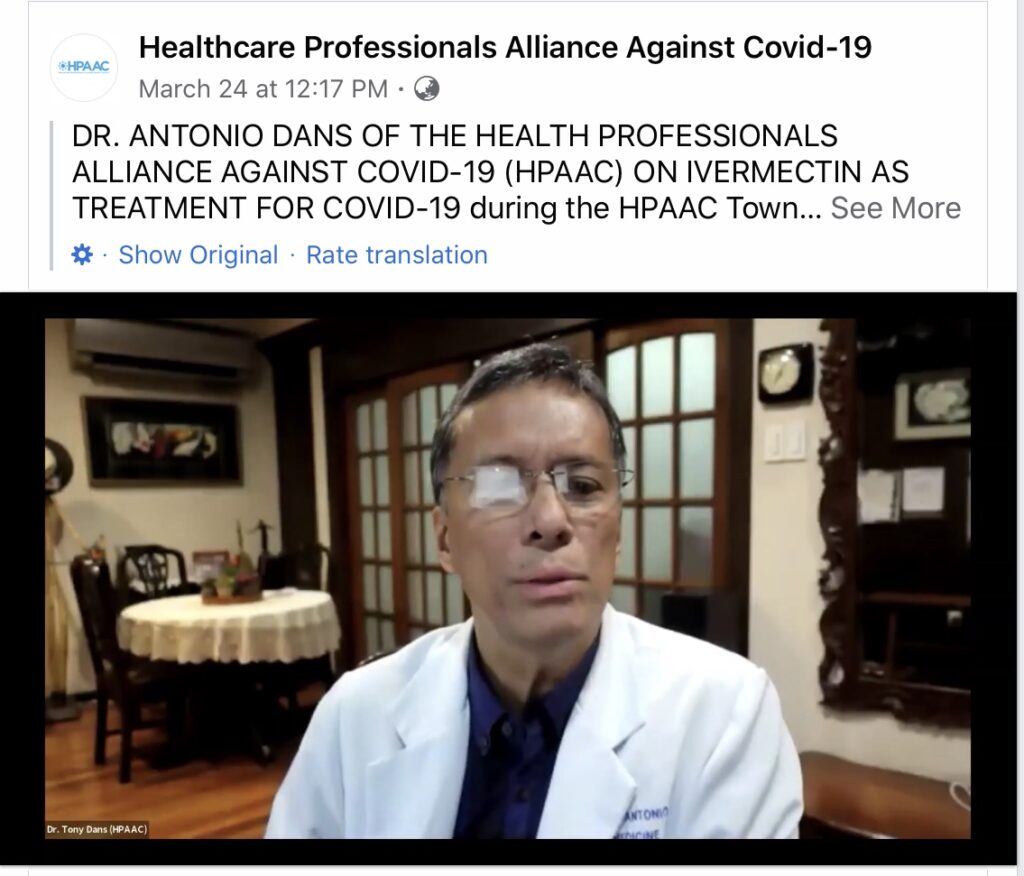Text by Henrylito D. Tacio
Photos sources: Dreamstime, US FDA, and Facebook
Farmers whose livestock are attacked by heartworm and ascariasis usually treat their animals with ivermectin. Discovered in 1975, it is used to cure other types of parasite infestations.
Starting in 1981, it was included on the list of essential medicines of the World Health Organization (WHO). In the United States, ivermectin is approved by the Food and Drug Administration as an antiparasitic agent. It can be taken by mouth or applied to the skin for external infestations.
“Ivermectin is widely used to treat human diseases caused by roundworms and ectoparasites,” Wikipedia states. “For river blindness and lymphatic filariasis, ivermectin is typically given as part of mass drug administration campaigns that distribute the drug to all members of the community affected by the disease.”
The United Nations health agency considers ivermectin the “drug of choice” for strongyloidiasis. Most cases are treated with two daily doses of oral ivermectin, while severe infections are treated with 5-7 days of ivermectin.
Ivermectin is also used to treat infection with parasitic arthropods. Scabies, for instance, are most commonly treated with oral ivermectin. Both head lice and pubic lice can also be treated with ivermectin.
Recently, ivermectin is hogging the headlines as some doctors are prescribing it as part of the treatment against the coronavirus disease 2019 (COVID-19) pandemic. In India, South Africa, and many Latin American countries, ivermectin is widely used as a COVID-19 drug.
Researchers from Biomedicine Discovery Institute at Monash University in Australia have found that ivermectin “could kill the novel coronavirus within 48 hours in a laboratory setting.”
Dr. Kylie Wagstaff was quoted by pharmaceutical-technology.com: “We found that even a single dose could essentially remove all viral RNA by 48 hours and even at 24 hours there was a really significant reduction in it.”


Treating animal and human (US FDA)
According to the Concerned Doctors and Citizens of the Philippines (CDC Philippines), twenty-two percent of the world is already using ivermectin to successfully fight COVID-19.
CDC Philippines is a group of Filipinos advocating for the use of ivermectin as a preventive and curative drug against COVID-19. “Multiple studies and meta-analyses confirm the effectiveness of ivermectin, a safe oral drug used for over 40 years for other illnesses in humans,” the group said.
“We respectfully appeal to our Honorable President Rodrigo R. Duterte, Senate President Vicente Sotto III, and Speaker Lord Allan Velasco to give serious, urgent and immediate attention to ivermectin as an inexpensive drug to prevent and treat COVID-19 during this public health crisis,” said a statement signed by various businessmen, private individuals, and leaders of various organizations.
The statement urged the president to direct the Food and Drug Administration (FDA), Department of Health (DOH), and the Department of Science and Technology (DOST) to do the following:
· Pro-actively look into the credible testimonials of a substantial number of Filipinos, including week-known members of Philippine society, and on the studies of several local and foreign medical researchers on the efficacy and safety of ivermectin in preventing and treating COVID-19 cases; and
· Issue the appropriate permit or authority to persons, natural or artificial, to manufacture, compound, import, distribute and sell ivermectin.
The statement also “respectfully ask the Congress to pass the appropriate legislation or resolution to expedite the availability of and easy access to ivermectin by the masses of our people.”
“We are in a severe public health emergency,” the statement added. “Our people are dying in big numbers on a daily basis and our hospitals can no longer accommodate those who are getting sick of the virus. The number of cases is growing bigger and bigger. Our people are desperate for a preventive and curative drug against COVID-19.”
One good thing about ivermectin is that it is cheaper than remdesiver, the current drug being used to treat COVID-19 infected patients. Remdesiver costs around P28,000 per vial and must be administered twice daily until the patient is discharged. “This drug is beyond the means of the average Filipino, most especially the poor,” the statement said.
Ivermectin, in comparison, costs only around P35. It has been sold over-the-counter for 40 years. For those infected with the COVID-19 virus, ivermectin “is generally administered for three days.” As such, the COVID-19 patient will only spend a little over P100 for the entire treatment. “The preventive dose is only once every two weeks,” the statement said.
On March 31, however, the WHO said, “the current evidence on the use of ivermectin to treat COVID-19 patients is inconclusive.” Until more data is available, WHO recommends that the drug only be used within clinical trials.
The recommendation follows the European Medicine Agency’s warning a week earlier against the genetic anti-parasite drug.
In the United States, the FDA was also against using ivermectin for COVID-19. “Never use medications intended for animals on yourself,” FDA explained on its website. “Ivermectin preparations for animals are very different from those approved for humans.”
Also, “taking large doses of this drug is dangerous and can cause serious harm,” US FDA warned. “Even the levels of ivermectin for approved uses can interact with other medications, like blood-thinners. You can also overdose on ivermectin, which can cause nausea, vomiting, diarrhea, hypotension (low blood pressure), allergic reactions (itching and hives), dizziness, ataxia (problems with balance), seizures, coma and even death.”
In the Philippines, the health department also told Philippine Daily Inquirer that there’s no sufficient data yet that ivermectin can treat or combat COVID-19. “There is no conclusive data at this time to show that ivermectin is effective in treating COVID-19,” FDA Director Eric Domingo was quoted as saying.
The COVID-19 pandemic in the Philippines is now described as “spreading like wildlife.” Vaccination against the dreaded virus is ongoing. But there are more Filipinos who are not yet immunized.
The figure of those infected with SARS-CoV-2 – the coronavirus that causes COVID-19 – is escalating. The death toll is also increasing. The economy is going down. Some people no longer follow the health protocols – wearing face masks and face shields, hand washing, and physical distance.
Now, there is a division – even among health professionals – as to whether ivermectin should be used or not.
“There are already a lot of people fighting about this ivermectin,” said Dr. Antonio Dans of the Health Professionals Alliance Against COVID-19 (HPAAC). “Those who are in favor of medicine are so angry because there is no FDA approval yet. Those who are against ivermectin are so angry because it’s not really effective and it’s medicine for animals.”
The HPAAC has this viewpoint: “The best evidence that ivermectin is promising – meaning it can be effective. This is the evidence: There are trials happening now in different countries. That’s a lot. That probably hasn’t happened to other diseases with so many trials – meaning tests that are performed if the medicine is effective. So that will not happen if there is no hope for ivermectin to be effective.
“But those 73 trials are also proof that there is still a lack of knowledge because if ivermectin is sure effective, those trials will stop,” Dr. Dans continued. “Now, the trials are just temporary. They are just looking after 28 days if there are more healed than those who were given ivermectin. So that means, in a few weeks, we’ll find out the true effect of this medicine. Does it work? Is it effective?”
Dr. Dans appealed to all health professionals “to stop shouting and insulting each other. Because the people are having more difficulties. Let’s just wait for the (result) of the trials.”

